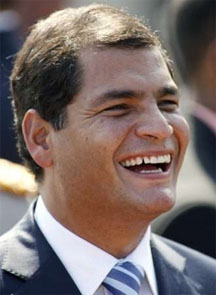QUITO, (Reuters) – Ecuadorean President Rafael Correa is fighting accusations by a government watchdog that he knew about $700 million in state contracts that the panel says were improperly awarded to his brother.
Correa denied the allegation made by a four-member committee he created in 2009 to examine the business dealings of his older brother and political nemesis, Fabricio, a conservative who has threatened to run against him in 2013.
According to a report handed to state anti-corruption authorities last week by the Citizens Oversight Committee, the older sibling secured a slew of state oil exploration and public works contracts that broke anti-nepotism laws.

Fabricio has denied wrongdoing in the matter.
“There are four videos and audios in which you can say that President Correa knew very well about the contracts,” committee chairman Pablo Chambers told Reuters on Monday.
The evidence has not yet been released to the public or media in the OPEC-member nation.
The allegations come at a tricky time for Correa, a leftist facing mounting opposition to his plan for a referendum aimed at reforming the country’s judicial system. He lost support in Congress last month when several coalition members broke with him over the issue.
Correa, still smarting from those defections, rejected the panel’s report.
“We are going to respond legally. I’m tired of this,” he said over the weekend, challenging the committee to make the evidence public. “I never knew about these multimillion-dollar contracts.”
Chambers said the report, which took 18 months to draw up, cites more than 40 oil exploration and public works contracts that cost the state $143 million because they were granted with overly favorable conditions to businesses linked to Fabricio.
“We are not saying that the president was involved in the contracts or benefited from the contracts. We are saying that he knew about them,” Chambers added.
Chambers is a Quito-based business consultant and economics professor. Two of the other three members of the watchdog committee are local businessmen and one works for the government’s “Contraloria” anti-corruption unit.
The period investigated by the committee started in January 2007 when Correa first took office.
Chambers said Fabricio and the state officials who granted him the contracts could be prosecuted.
A spokeswoman for Fabricio said he had no comment, but may speak in the days ahead.
REFERENDUM POLITICS
Fabricio, who last year launched his own political party and said he might run against his brother in 2013, accuses his younger sibling of chasing away private investment with state-centric policies.
Correa’s government is more stable than those of his predecessors, but it was badly rocked in September by violent protests staged by police over public sector bonus cuts.
Ecuador has meanwhile been hit by rising crime as its economy recovers sluggishly from the global crisis.
The opposition says Correa’s planned referendum, to be held later this year, is a veiled attempt to strengthen his grip on Ecuador’s institutions by controlling judicial appointments.
He dismisses the accusation.
Correa, elected on promises of increasing state control over natural resources and fighting what he calls the country’s corrupt elite, says the referendum is needed to restore security by getting rid of corrupt judges.





